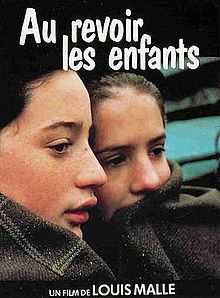Au Revoir Les Enfants

Movie watching is a funny thing. There are so many new films I plan to watch such as current Academy Award winning films or those of the past two or three years. And yet when I peruse the possibilities on Netflix, I discover there are so many older movies that I always meant to watch but never did. Au Revoir Les Enfants is among them
This film is based on the childhood experiences of director Louis Malle. As an eleven-year old boy he attended a Catholic boarding school in France during World War II. In this sensitive and understated film, the main character, Julien, attends school with his older brother, Francois. Unbeknownst to the students, the principal of the school, Pere Jean, (based on the real life priest, Father Jacques de Jésus), decides to hide three Jewish boys among the students.
Of course, Julien dislikes Jean Bonnet, the one who is assigned to sleep in the bed next to his. Julien lashes out at Jean on several occasions, including when Jean’s superior skill with the piano is shown in a scene with the radiant actress, Irene Jacob, who plays a small role as the music teacher.
The two boys finally end up forming a friendship when they become separated from the other students while playing a game of “Capture the Treasure” in the woods. Walking back to the school, German soldiers pick them up and return them to the priests. Jean is visibly terrified even though the soldiers are not unkind to them during the incident.
Eventually the Gestapo come to the school and find and arrest the three Jewish boys and Pere Jean. In the final narration we learn that the boys died at Auschwitz and Pere Jean died at Mauthausen concentration camp, which was the real fate of the people depicted in the film.
What never ceases to amaze me are the powers of observation and acute memory of some children. So many of the books and films about childhood suffering that we find most moving are based on the real experiences of their authors. For example, Charlotte Bronte and Charles Dickens wrote of the cruelty of English boarding schools with the vivid realism that could have only stemmed from traumatic memories.
I recently saw an interview with writer and professor, Camille Paglia, who spoke with concern about the current generation who seems to be so present-era centered. Modern young people have little historic perspective and often have an attitude of entitlement regarding their own rights and have little awareness of what young people (or anyone) suffered in previous generations. I highly recommend the viewing of this film along with others of the same genre including Robert Benigni’s 1997 film, Life is Beautiful and George Steven’s 1959 film based on the play, The Diary of Anne Frank.
Watching movies isn’t the same as studying history books, but it does provide an emotional impact that the dryness that textbooks tend to deliver. Without direct depiction of violence or depravity this film manages to powerfully convey the horror of war.


